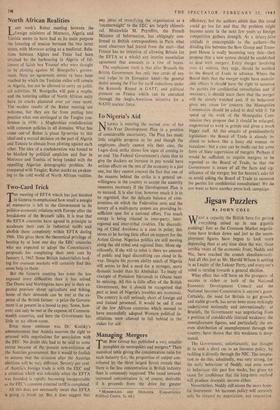Managing Mergers
THE Bow Group has published a very sensible pamphlet on monopolies and mergers.* Their statistical table giving the concentration ratio for each industry (i.e., the proportion of output con- tributed by the three largest firms) reveals that there is far less concentration in British industry than is commonly supposed. The trend towards increased concentration is, of course, desirable if it proceeds from the drive for greater * MONOPOLIES AND MERGERS. (Conservative Political Centre, 3s. 6d.) efficiency, but the authors admit that this trend could go too far and that the problem might become acute in the next few years as foreign competition gathers strength. As a laissez-faire attitude is unacceptable to the authors—the dividing line between the Bow Group and Trans- port House is really becoming very thin—they propose that a new system should be established to deal with mergers. Every merger involving over £1 million, they urge, should be notified to the Board of Trade in advance. Where the Board feels that the merger might have undesir- able effects it should have the right to summon the parties for confidential consultation and. 'if necessary, it should warn them that the merger will be closely watched and, if its behaviour gives any cause for concern, the Monopolies Commission should be asked to deal with it. To speed up the work of the Monopolies Com- mission they propose that it should be enlarged, empowered to work in groups and given a much bigger staff. All this smacks of grandmotherly legislation—the Board of Trade is already in- clined to behave like a fussy old woman on occasions—but a case can be made out for some form of State supervision of mergers. Perhaps it would be sufficient to require mergers to be reported to the Board of Trade, so that the Government is aware of all the facts and sig- nificance of the merger, but for heaven's sake let us avoid asking the Board of Trade to summon the parties for confidential consultation! We do not want to have another press leak campaign.


































 Previous page
Previous page